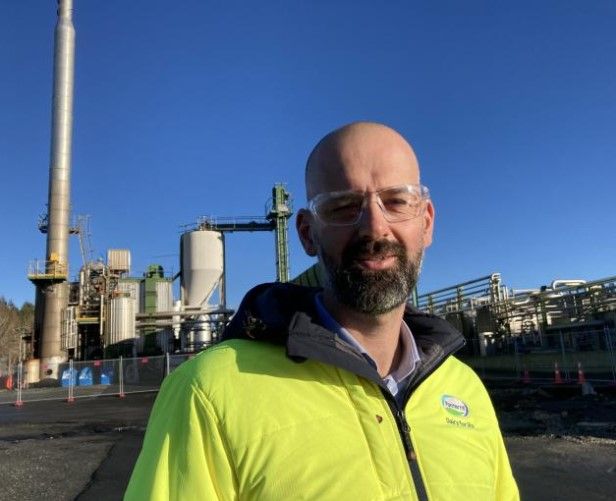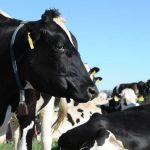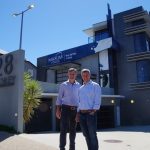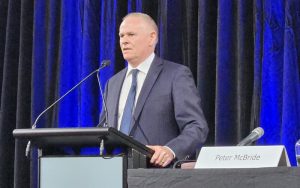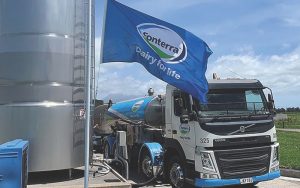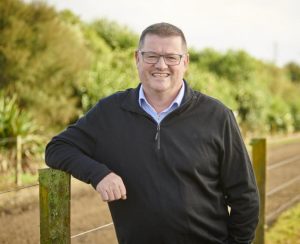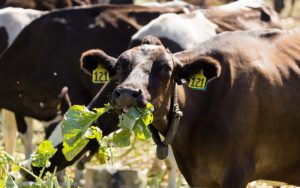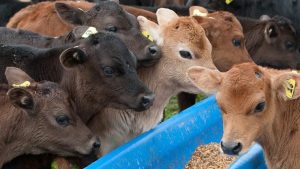
From test tubes to testing himself in leadership, Fonterra’s general manager of operations for the lower South Island is helping steer the dairy giant through perilous pandemic times.
Based at Edendale in Southland, Mr Gray said it had more or less been business as usual through the alert levels.
‘‘From the supply chain point of view there has been disruption with delays or longer lead time to deliver, but we’re still exporting well. But it’s the timing, having to adjust some of the production planning processes to allow for that longer lead time.’’
Of the 25 Fonterra manufacturing sites throughout the country, Edendale, established in 1881, is the oldest, and won the company’s Best Site Cup this year and the Best Large Site award for the team’s efforts and exceptional performance this season across the board in quality, safety, sustainability, asset management and operational efficiency.
It also secured the Transformation Cup for its sustained performance improvements over the past three years across budget, safety, plant reliability and product quality.
Mr Gray (44), who has been at Edendale for seven years, oversees an operation that employs about 700 people, processes 15million litres per day, and exports 14million bags of milk powder per year.
Little over an hour away, he also oversees the Fonterra Stirling cheese factory near Balclutha, which employs 110 people, exports 90% of its cheese around the world and processes 1.5million litres of milk every day.
Te Puke-born, and raised in Waikato, he thinks his family background probably did not influence his career path in the dairy manufacturing industry; his great-grandfather, who was a builder in the Bay of Plenty, constructed some of the old dairy factories in the region.
When Mr Gray’s father left school, he started at the Te Puke dairy factory, and stayed in that industry his whole career, working in the butter plant and milk powder plant, then went on to work for the former Ministry of Agriculture and Fisheries as an auditor/compliance inspector at dairy factories.
He carried on doing similar work, self-employed, around the dairy industry and food processing.
‘‘I don’t think it did really steer me, I think it’s coincidental. Dad and I can have some pretty good discussions around what’s happening in the industry. New Zealand’s a small place and the dairy industry is even smaller, and the number of people that dad’s worked with in the past that I work with now is quite interesting.’’
After completing a bachelor of science and technology degree, majoring in chemistry, Mr Gray started his first permanent job with Fonterra at the Hautapu factory, just out of Cambridge, in the late ’90s. Later on he did an undergraduate diploma in dairy technology.
He was a technician in the laboratory, testing products to make sure they met final requirements for export cheese, and a range of other protein products from other sites around Waikato.
After a couple of years he was considering heading away overseas.
‘‘Then I got offered a role in one of the processing plants, and thought I’d give it a crack, as a process operator for a period of time. Then I got offered a supervisor’s role, then systems manager’s role, so was more of a progression through different roles, rather than having a specific aspiration to be in a management role.’’
His career has progressively brought him south.
After Cambridge, he went to the head office at Hamilton for a few years, in a support role to the general manager.
In June 2005, fire destroyed the Fonterra Takaka dairy factory at Golden Bay.
Not long after that, he was sent down to look after it and also the Brightwater factory.
Following a five-year stint, he went to Canterbury, as site manager at the Darfield plant, at the same time as construction started for the two large milk powder dryers. This was just after the 2010 September earthquake, which was followed by the devastating 2011 February quake.
He was there four years before moving with his wife, Michal, and their three children to Southland, in 2014.
‘‘Moving down here to a larger site and a larger region, with Stirling as well, with the complexities of the project, interested me in moving on to something that was a bit different.
‘‘I really like the problem-solving side of things, and the good thing about the dairy industry is that no two days are ever the same, and you always get different problems that come about.
‘‘We have a raw material that varies across the season, we have processing that has different principles in how they deal with the product, so I enjoy learning and the more technical aspects of manufacturing.’’
His trajectory from technician to manager is not that unusual in a company where people tend to stay long-term and move through the ranks.
‘‘My career path is not atypical but probably a very traditional sort of career path. As times change we are starting to see a lot more diversity of roles and experiences coming through as well, and people moving around different roles in the co-operative coming into some of the manufacturing roles.
‘‘I’ve been lucky in my career that I’ve had opportunities come up, probably come at the right time, and I’ve been flexible with the opportunities that I’ve been able to take up.
‘‘I’ve moved around a fair bit, so I was lucky to be given a chance at quite a young age to some leadership positions quite early on when I was 23, when I got my first production supervisor’s role, looking after a team of people. I was given chances early.’’
He and his family were well ensconced in Southland and enjoying the outdoor life.
‘‘Personally myself, I’m not super-ambitious. I really enjoy the role I’m doing now, my family and I love living in Southland so we’re pretty well settled, but I am ambitious for the industry.
‘‘If you look at where we’ve come from in 150 years since the first co-operative was formed, to now, even taking the site here at Edendale, the amount it’s grown from the early ’90s through to now is pretty significant, with changes in technology.
‘‘I think we have to continue that ambition, and adoption of technology to change.
‘‘Things like fuel switching of our new boilers is great, and other technology that we can use to decrease our emissions, is going to be really important, and having that strong ambition to improve, and play our part in the community, whether that be environmentally or in a partnership perspective.’’
